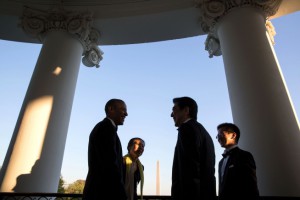Back on July 31, WikiLeaks released a set of NSA targets and intercepts involving Japan.
Along with business targets and discussions of trade agreements, the intercepts included one that described results of a meeting at Prime Minister Shinzo Abe’s official residence (the intercept dates to Abe’s first term as Prime Minister in 2007).
At issue was whether Japan would publicly mention that it was embracing aggressive climate emission reductions at an upcoming summit in DC, a goal Japan worried would sour US relations. “The [Ministry of Foreign Affairs] was considering not informing the U.S. in advance of its intention, because the ministry did not expect Washington to approve of such a goal, based on the U.S. reaction to climate change issues so far,” the intercept explained. The intercept did not specify whether the reference to Abe’s residence reflected a wiretap there, or only at MFA, but it clearly cited the meeting in Abe’s home as intelligence. “It was apparently decided at a briefing at the Prime Minister’s official residence that Abe will clearly state the goal at the bilateral summit, with advance notification to the United States.”
On August 4, Joe Biden telephoned Abe to apologize. According to the official White House readout, Biden reiterated President Obama’s assurances from last year that the US would only spy on “national security” targets. “The Vice President reaffirmed the United States’ commitment made by President Obama in a 2014 presidential directive to focus our intelligence collection on national security interests.” After promising the US would only spy as necessary, the official readout described, Biden recommitted to closer ties with Japan in coming months. “The Vice President and Prime Minister highlighted the historic level of cooperation between our two countries and committed to further strengthen the relationship in months and years ahead.”
On Wednesday — as a number of outlets reported — President Obama called Abe himself to apologize, as well as thanking Abe for a lukewarm expression of regret for Japanese aggressions during World War II. According to the US side of the conversation, Obama “reassured the Prime Minister that our intelligence collection is focused on national security interests and is as narrowly tailored as possible.” According to the Japanese side of the conversation, “Prime Minister Abe told [Obama] that, if the Japanese people concerned were subject to these activities, it would risk jeopardizing trusting relations between allies.” Perhaps most interesting, however, Obama issued his apology while calling for continue cooperation on the two subjects — climate change and trade agreements — that the WikiLeaks intercepts showed were the target of spying. “President Obama and Prime Minister Abe reaffirmed their commitment to work together to conclude the Trans-Pacific Partnership agreement as soon as possible, and to continue their cooperation in combating the impact of climate change.”
In other words, amid a contrite conversation about whether the US was still spying on top ministers describing what they had discussed about climate change with Abe in his personal residence, Obama and Abe reiterated their plans to cooperate on climate change. Even as Abe said the US had better not be spying on top ministers discussing trade deals, he and Obama agreed they would continue to work on the Trans Pacific Partnership.
Or, to put it differently, Obama and Abe made a big show of pretending that the NSA doesn’t spy on Japanese ministers about their trade deal stances so that Abe would appear to be negotiating the TPP with Japan’s best interests at heart.



